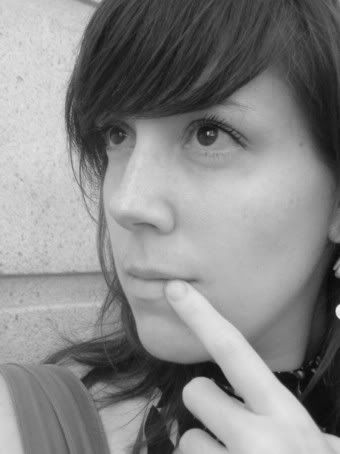When I was in grad school, the creative writing program often set up mini-conferences for its students when visiting writers swung into town for Good Thunder readings. I landed myself in a couple of these mini-conferences over the three years I was there, but there is only one that I will remember so clearly for the rest of my days. I won't name the author--that would just be catty and rude--but I will tell you the author was a he, a he who was full of swagger and bravado, so much so that being in his presence made me feel inferior because I am not a man, nor full of any swagger or bravado of my own.
Before the conference, I submitted one of my newest stories for this visiting author to read. At the time I was pretty proud of this story, which was about a girl who had a bad case of pica--a condition where a person eats dirt, stones, hair--anything considered nonnutritive. The girl enrolled in group therapy and met Adam, who was in for Depersonalization Disorder. He felt phantom limbs and was significantly detached from reality. I made the two of them fall in love and move in together, against doctor's orders.
I liked the two of them. They were quirky and weird. But that was also a problem. I was too wrapped up in quirky and weird to make them real. I realize that now, but back then I was still developing my sense of story. This was the last thing I wrote before I went through my big change, on the other side of which I was writing stories like mad, and all of them made it into my thesis. The story I submitted for this conference didn't make it anywhere near my thesis.
Still, it's not horrible. And the visiting author didn't think so either.
"You're going to be published soon," he told me after I settled into a chair opposite him.
I couldn't help myself--I beamed. That was good news, and I didn't mind hearing it out loud. But then I looked closely at the visiting author. He seemed to be frowning. He didn't seem particularly happy about what he'd just said.
"There's a market for writers like you," he said. He told me I was wrapped up in my pretty words and sentence structure. "This is poetic," he said, but when he said poetic his nose wrinkled.
I flipped open a notebook and started recording his criticisms. He didn't like the way my characters talked. He thought it was too clever. He got worked up about my writing T-shirt as t-shirt. "It's called a T-shirt because the shirt actually looks like an uppercase T," he said. He flapped his arms in the air, illustrating. "See? Not a lowercase t."
I opened my eyes wide and nodded, like I was amazed, like I'd never considered that before. "I see," I said.
"Where are you from?" he asked.
"New York," I said. That's a knee-jerk response. New York is a big state, and you'd think people wouldn't automatically assume you mean the city when you say New York, but they do.
"Yeah," he said. "That makes sense. You know what's irritating about writers like you?"
My gulp was probably audible. "What?" I asked.
"You have no sense of place. Your stories always default to New York City. You just assume that your readers have been there, know what it's like, and will automatically get that this story is taking place in the big city," he said.
"This story doesn't take place in New York," I said. In fact, half of it took place in the tropics, after the couple went on vacation. The rest of the story took place in the girl's house, which featured a giant deck and lawn. I haven't seen too many full size houses with decks and lawns in Manhattan. "Also, I'm from Buffalo. Not the city."
But the visiting author didn't seem too concerned with the giant difference between Buffalo and New York City. He waved his hand in the air and continued to page through my story. "Same difference," he said.
I stopped writing things down after that.
Still, every time I start a new story I can hear him in the back of my head. Place! he says. Place! But that's not me. Some authors are authors of place. I'm not. I like to think of myself as a writer of characters, someone who thinks the people she's writing about are the most important part of a story, not the population or demographics of where they're living. That's not to say there aren't times when the place becomes a character in a story, times when it plays a giant part in forming the characters of the story, but that rarely happens in my writing.
Of course, me thinking that doesn't always silence the visiting author's voice that squawks The trouble with writers like you is... during the writing or editing process. Still, I'm pretty good at flipping a switch and filtering all that stuff out. If I didn't, I feel like I'd be regressing in my writing style, and my stories would all begin the way they did when I was eleven years old:
Sandy and Ricky are best friends. Sandy lives in a white house with blue shutters. She has long brown hair. She is tall. Ricky lives in an old apartment with green wallpaper. He is short. They like to play Twister. Ricky likes Twinkies. Sandy likes grapes. They are ten years old. They go to school at Franklin McLean Middle School.
And who could read more than a paragraph of that?
Subscribe to:
Post Comments (Atom)

No comments:
Post a Comment